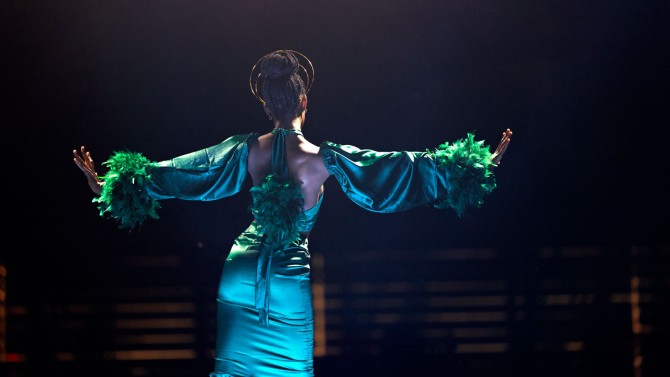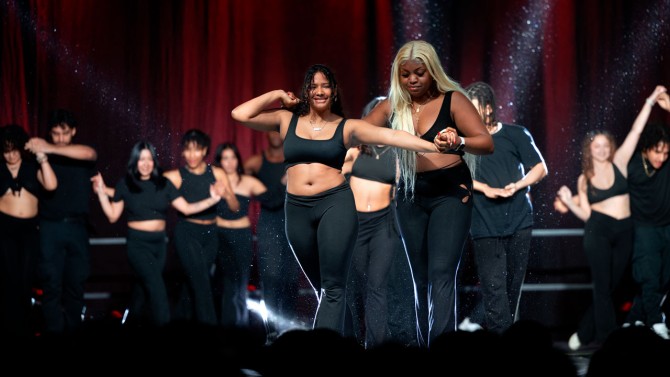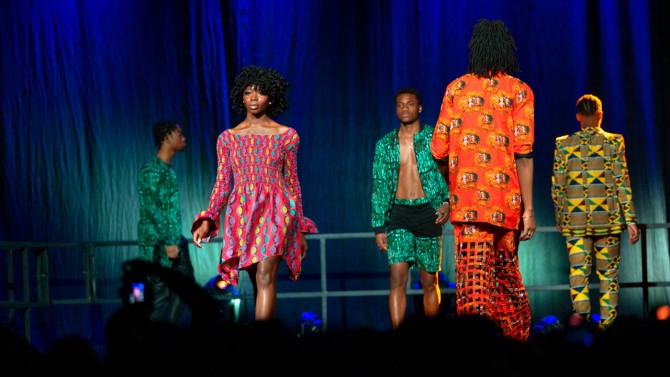Fashion show to celebrate, unite cultures of the African diaspora
By Caitlin Hayes, Cornell Chronicle
At the 2024 AFRIK fashion show, organizer Jaida Anekwe ’25 peeked from backstage and saw everything she and her team had worked for – in motion.
The student models strutted in designs representing numerous regions of the African diaspora, and a crowd of nearly 1,000 students, also dressed to the hilt, danced along.
“I just felt so proud. The audience was cheering, the models were in character and displaying the clothes so beautifully,” said Anekwe, a human development major in the College of Human Ecology and the College of Arts and Sciences (A&S) and president emeritus of the Pan-African Students Association (PASA), which hosts AFRIK each year. “It was great to see people from all different races enjoying it – that was part of our goal, and we accomplished it.”
This year’s AFRIK, the 20th, to be held March 15 in Barton Hall, continues the mission of celebrating cultural unity and diversity across the African diaspora while bringing students of African descent together and sharing Pan-African cultures with the wider Cornell and Ithaca communities. The event will feature clothing from seven professional designers and four student designers incorporating a range of cultural influences, from African to Caribbean to African American.
Thirty-two Cornell students will model the clothes on the runway, and six student groups will perform music and dance, including Baraka Kwa Wimbo, an all-women gospel a cappella group; the Caribbean Students’ Association Dance Ensemble; and the African Dance Repertoire.
“It’s going to be a commemorative show, bringing back a lot of designers we’ve worked with in the past,” said Aminata Jaiteh ’26, the current PASA president and a government, Africana studies and American studies major (A&S). “A lot of people anticipate AFRIK every year, and we hear from so many people that it’s their favorite event at Cornell.”
The event has been held since the founding of PASA, although two years ago, it outgrew Duffield Hall, its original venue with a capacity of 650, and moved to Barton to accommodate more attendees. The focus on fashion allows the group to showcase many things at once: the music of the diaspora; the student models; and the designers and their artistry, which often challenges stereotypes of gender, race and nationality.
“Often, the designers are breaking norms or notions about who can wear what and in what ways people should dress,” Jaiteh said. “The event also helps people recognize all the different cultures within the diaspora, because even some people who are members of the Pan-African diaspora don’t really know about the movement itself and what it embodies.”
“It’s very dynamic,” Anekwe said. “And when people see students wearing these clothes, I think it makes it more relatable – people in the audience can see themselves in the clothes, too.”
Jaiteh said the PASA executive board begins organizing the event almost a year in advance, brainstorming a theme, booking the venue and contacting designers. Prior to the show, student models commit eight hours to training, and designers tailor clothes to the models’ measurements.
“Part of the preparation is becoming versatile,” said Anekwe, who will model in the show for the first time this year. “You try different walks depending on the line you’re in – you try to embody the style.”
Students involved in AFRIK and PASA meet the professional designers before the show and hear stories of how they started their brands. PASA students also benefit from the experience of planning a large-scale event. For Jaiteh, who is the main point person for designers and vendors and the primary coach for the models, the role has given her skills that could transfer to any field.
“It’s opened me up to a different world,” she said. “It’s helped me build my leadership skills, my communications skills, a lot of tangible skills that I’ll use later on.”
While AFRIK is PASA’s largest event, the group celebrates and brings together the Pan-African student community throughout the year, hosting an annual talent show that drew 400 people last fall and a field day in the spring. In February 2024, the group held a Taste of the Diaspora event with a “Rice Wars” competition for best take on the dish.
For Anekwe and Jaiteh, who have both been members of PASA’s executive board since their first years at Cornell, the group gives them a connection to home and to the diversity of cultures within the diaspora.
“One function PASA serves is providing a connection point, a tether for a lot of different cultures in the diaspora,” Anekwe said. “When we have our events, I’m able to connect with my Nigerian roots but also learn about other places. AFRIK itself is like that – I see things that remind me of Nigeria – Ankara fabrics, for example – but then I’m also seeing Caribbean designs and African American designs – and how they’ve all influenced each other.”
Tickets for the show are available at tabling events throughout the week, which are posted on PASA’s Instagram account. Doors open at 7 p.m.; attire is formal.
Media Contact
Get Cornell news delivered right to your inbox.
Subscribe



